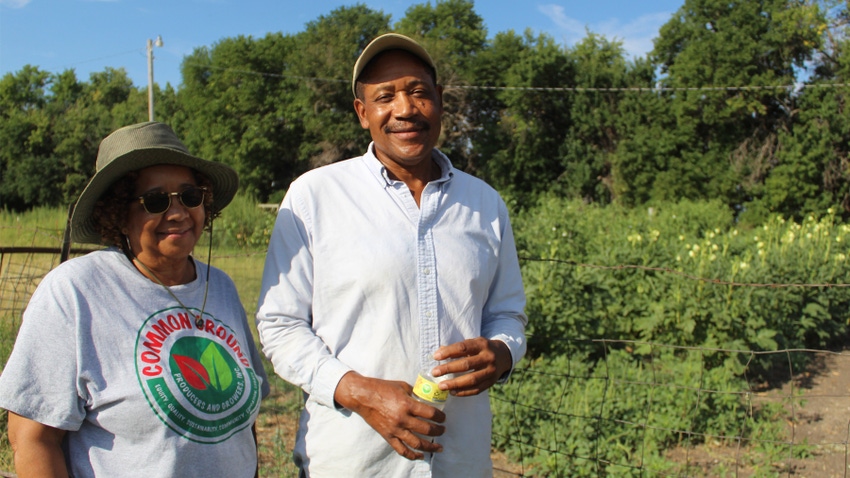
Editor’s note: This is the second in a three-part series featuring the Class of 2022 Kansas Master Farmers and Master Farm Homemakers. Read Part 1 at bit.ly/kmasterfarmerteamwork.
What makes a Kansas Master Farmer and Master Farm Homemaker stand out above their peers?
It’s going the extra mile. Not just excellence in building their farms and raising their families, but being mindful of how they can build and raise up their communities.
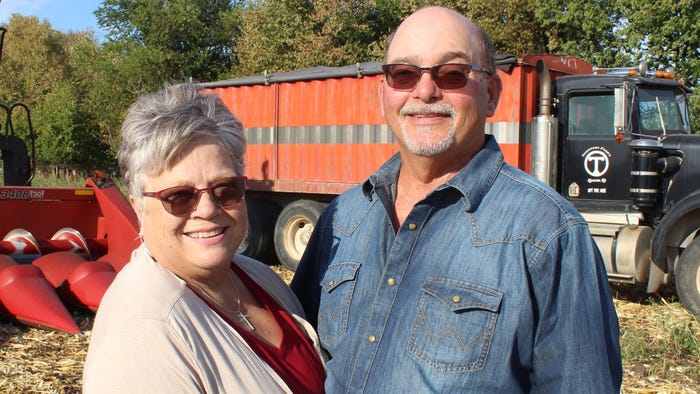
SERVICE TO COMMUNITY: Rick and Connie Thompson farm near Kincaid, Kan. In addition to their farm and family obligations, the couple has spent their married life giving back to the community, whether volunteering with the Kincaid Fair, or serving Kincaid Selma Community Church, 4-H, local ball teams, school boards, their township, summer rodeo camps, Anderson County “Spirit of Christmas” committee and others.
Service to others is a key hallmark of our next two Class of 2022 families — Donna Pearson McClish and David Pearson, Wichita, and Rick and Connie Thompson, Kincaid.
David and Donna are the first siblings, and first African Americans, named to a Kansas Master Farmer and Master Farm Homemaker class. The Pearson Family Farms are a 40-acre plot just north of Wichita where they grow vegetables and goats. Today, the siblings and other family members raise specialty vegetable crops to bring healthy produce to food deserts in the city through their family’s Common Ground Mobile Market and Mobile Food Hub.
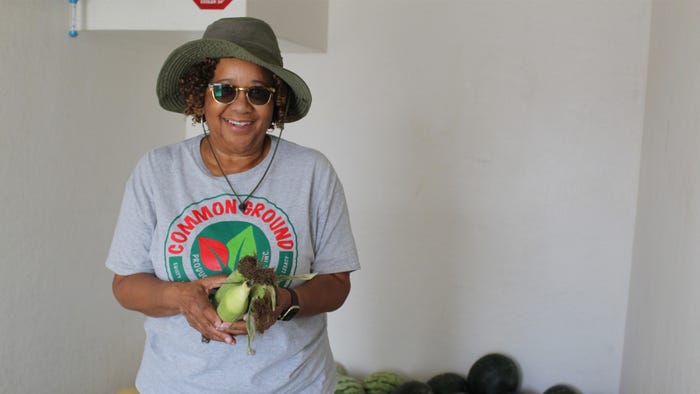
MOBILE FOOD: Donna Pearson McClish stands in the Pearson family’s large cooler, where they store fresh produce from the farm before distribution. Their Common Ground Mobile Market takes the produce stand to the people. This provides access to nutritious produce in food deserts.
Rick and Connie Thompson raise corn, wheat and soybeans, and have a flock of commercial sheep. They live near a small community of about 200 called Kincaid, in eastern Kansas. They see service to their community as a way to keep the place they love thriving for the next generation.
Why do your families make time to serve your community?
Pearson and Pearson McClish. The siblings’ parents purchased the property in 1968 to move their large family of 12 children from the city into the country after their community was turned into an industrial area.
“In the 1960s and 1970s, we were more community-minded,” Donna says. Neighbors knew each other, looked out for each other, and there was a grocery store on nearly every corner. But, over the decades, that community connection between neighbors has fractured, as neighborhoods were broken up and larger big-box retail stores and grocery stores pushed out the smaller mom-and-pop shops that provided local food access to communities. This led to vulnerable populations struggling to get access to fresh and affordable produce.
“There are people we serve who cannot walk [to the store],” Donna explains. “So if you catch the bus, it takes all day to go to the grocery store, then you got to pick up the groceries, you got to bring them back to your house from the bus stop.” One elderly lady told them grocery shopping is a three-hour process, for a few bags of groceries she can carry.
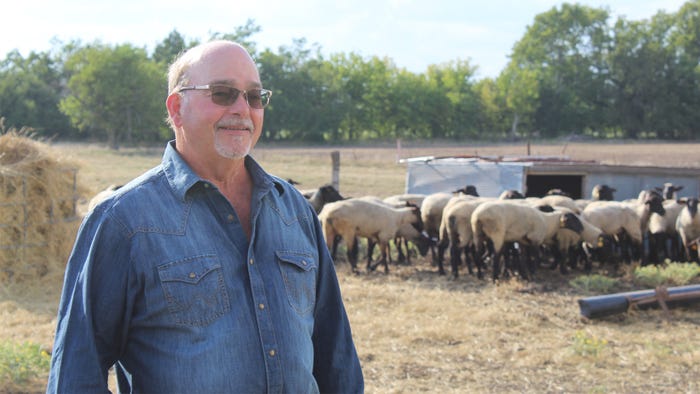
SHEEP KNOW-HOW: Rick Thompson purchased his first flock of commercial ewes in 1981. Over the next several decades, he taught himself how to care for his flock of commercial sheep and has passed that knowledge on to others in the area.
Thompsons. The Thompson family invests a lot of time into the community through many different organizations and committees. From the Kincaid Selma Community Church to 4-H, local ball teams, school boards, the township, summer rodeo camps, the Anderson County “Spirit of Christmas” committee and more.
But of all their volunteer hours, the one that stands out is the annual Kincaid Fair. This three-day event, in its 113th year, regularly draws up to 12,000 people back to Kincaid (which has an average population of about 200) for contests and other fun activities.
“It’s about the only thing Kincaid has left,” Rick says. “It’s a big homecoming.”
Connie is currently the vice president of the Kincaid Fair Association and says she finds a lot of joy in the volunteering. It’s possible, she says, to serve more than one organization and make a difference.
“It comes back to if someone doesn’t do these things, fun things don’t happen,” she says. “And I like doing it.”
How are you passing your knowledge on to the next generation?
Thompsons. The Thompsons say it’s important that they pass these lessons of service on to their children and grandchildren, so that traditions continue and their community can continue to support families.
Son Blake and his wife, Hannah, are volunteering with the Kincaid Fair now. And so is daughter Erin, who’s following in Connie’s footsteps in the baking department. Hannah started a 5K and a half-mile walk.
During the fair, Rick and Blake are in the Lions Den concession stand, serving upward of 2,000 hamburgers and 900 pounds of french fries each year
Connie says that civic organizations are struggling to recruit members and volunteers. Therefore, it’s important to encourage the next generation to take on those volunteer roles.
“Fun things don’t happen without those volunteers,” Connie says.
Pearson and Pearson McClish. Donna and David explain that the Common Ground Mobile Food Hub not only brings fresh produce to vulnerable communities, but it also is a way they can teach those communities about farming and agricultural skills. They invite school groups to the farm for field days. They invite college interns to the farm to learn about organic agriculture and small livestock.
They call it feeding the body and the soul.
“Farming is a great life, and God is wonderful,” David says. “I feel like we are just stewards over the land, and we just maintain it to pass to the next generation.”
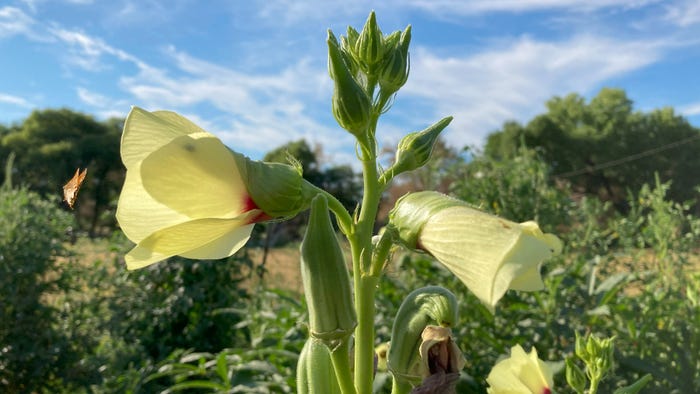
GOOD DEEDS: A pollinator leaves this okra blossom at Pearson Family Farms, Wichita, Kan.
What do you wish people understood about community service?
Pearson and Pearson McClish. Donna serves on many local and state boards, providing insights to what their community needs. She is the first African American appointed to the Kansas State Board of Agriculture, and she is the Kansas State University Extension board secretary. She’s the first African American to serve on the Kansas Farmers Union board of directors, and one of the first African Americans to serve as a National Farmers Union delegate from Kansas. She says each is an opportunity to tell people about the needs of the underserved populations in Wichita.
“The one thing that I don’t think people know is how great the need is,” she says. “How deep it has evolved over the decades.” The pandemic exposed a lot of inequities to light, she adds, but there’s a lot of work yet to be done.
Thompsons. For Rick and Connie, it’s important that they pass along the kindness and integrity their parents instilled in them along to the next generation. It’s about taking care of God’s creation, thy say, and leaving it in a better place than they found it.
“God gave us this wonderful life as a blessing, and it’s our job to make the best of it,” they say. “No matter what job you choose, do it well, do for others and give back blessings to others.”
About the Author(s)
You May Also Like






